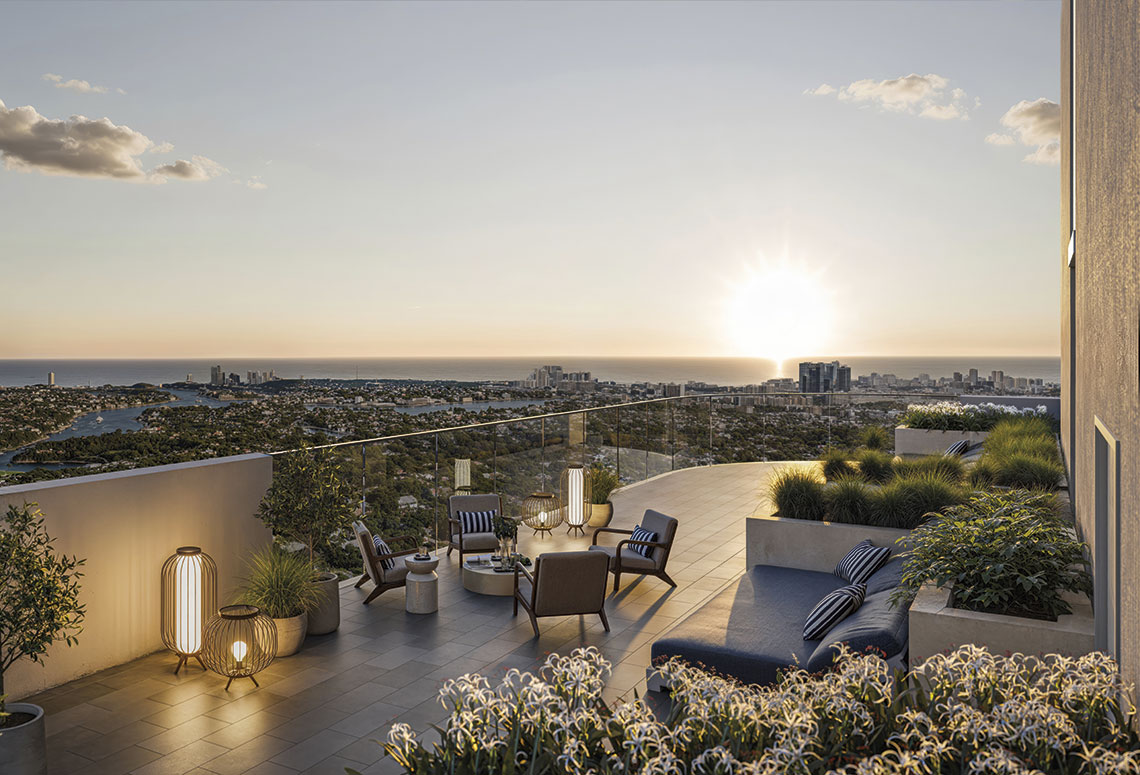Sky-high apartment rents in Fort Lauderdale may be losing altitude. The average asking price for monthly rent in Fort Lauderdale was $2,220 in the fourth quarter of 2022, according to the Federal National Mortgage Association, or Fannie Mae, a government-sponsored buyer of mortgage debt. But local growth in average rent decelerated to just 0.1% in the fourth quarter after slowing in the two previous quarters. “Rent growth in Fort Lauderdale has fallen for the third consecutive quarter,” the institution reported, “and the amount of new [apartment] supply that continues to stream into the market leaves little room for future rent growth.”
But unfazed developer Willie Frias believes his team has the right location, the right building height, and the right integrated approach to deliver apartments near downtown that are priced below the most costly. “The upper echelon of that market is pricing people out,” he said. “We tend to be below our competitors. We don’t want to be unattainable.”
Frias and his partners are planning an unnamed 12-story, 171-unit apartment building on what is now a junkyard just west of the Florida East Coast railroad, where popular Flagler Village ends, and Progresso Village begins. “To be honest with you, Progresso Village is a ‘B’ location in the Fort Lauderdale market, at its best, although it is transitioning, no question. So, we’re going to be at ‘B’ level rents,” Frias said, with tenants paying monthly rent that averages about $2.50 per square foot.

That would translate to $2,000 a month for an 800-square-foot apartment. By comparison, in mid-June, a 960-square-foot apartment with one bedroom was available for $4,111 a month at Icon Las Olas, the 46-story downtown landmark at 500 E. Las Olas Blvd. Size matters, of course, but bigger isn’t necessarily better. “We’re not building a 20-story project, which is expensive to build,” Frias said. “We’re building a 12-story project, which is still expensive but materially more cost effective.”
His development team paid $9.4 million for the apartment development site in Progresso Village, a 1.3-acre junkyard at 4 NW Seventh St., just north of the Sistrunk Marketplace & Brewery. “It’s an automotive salvage yard at the moment,” he said, “and we’re going to be doing some remediation of the site alongside with the development.”

The unnamed apartment development in Progresso Village is planned about a half mile from the construction site of Advantis Station, a rental project Frias and his partners are developing in Flagler Village. That project will be a 12-story, 242-unit apartment building at 600-618 NE Third Ave. with what Frias called “B-plus” rents. Asked if rental development in and around downtown is putting too many apartments on the market, he said overbuilding is unlikely because inflated construction costs and high interest rates will prevent construction of some of the biggest pending developments. “Everyone that’s building in the Flagler Village market is building a 20- or 30-story high-rise. Those don’t pencil anymore because of construction costs,” Frias said. “If you look at the supply pipeline and you look at what’s slated to break ground, almost a quarter of the projects will never happen. Because people are not going to build 20- and 30-story projects with high interest rates, which makes financing difficult.”
Frias knows a thing or two about financing. He ran a private hedge fund for high-net-worth clients in New York together with Navish Chawla before the pair moved to Florida about three years ago to develop apartments in partnership with Richard Zahn Sr., chairman of Prospect Real Estate Group, based in DeLand, about 240 miles north of Fort Lauderdale.
Prospect Real Estate Group is a do-it-yourself developer with its own construction company and a division that does in-house mechanical, electrical and plumbing work. Prospect even produces some of the concrete for the 5,600 apartments it currently has under construction or in development, reducing the risk of supply-chain issues, a legacy of the COVID-19 pandemic. “Because of the unfortunate times, concrete is very, very hard to get our hands on. So, we decided to take on manufacturing our own concrete. We own a concrete plant in Fort Lauderdale, and we’re under contract to close on a second one in Pompano,” Zahn said in a June 5 interview. “Windows and roofs, we don’t do in-house. Pretty much everything else, we do in-house.”
Even project financing has an in-house quality because the Prospect team raises equity investments through a partnership with Miami-based Midtown Capital Partners. Midtown runs a fund for real estate investors that helped to pay for Prospect’s rental development sites in Progresso Village and Flagler Village. “We control 40 percent of their fund,” Zahn said. “So, we’re able to close deals within our own fund parameters without having to go to the market, per se, to seek equity.”

In early June, vertical construction of Advantis Station was starting, and the Flager Village apartment building was expected to open in 2025. And if the Prospect team breaks ground for its rental project in Progresso Village as scheduled, by early 2024, it would open in 2026.
Neither development was ever seen as a condominium project instead of multifamily rental housing, said Zahn, who runs Prospect Real Estate Group with his wife Michele Zahn, the company’s president and CEO. “We’ve done some condo projects in the past. If I don’t ever build another condo for the rest of my career, I would be very happy,” he said without elaboration. “We’re multifamily-for-rent guys.”
Both of Prospect’s developments could face a herd of competitors when they open. In its report on Fort Lauderdale’s rental market, Fannie Mae noted that the local development pipeline is packed with planned apartments that would add 5% to 10% to the city’s total inventory of rental units: “There are currently close to 11,250 units underway – the highest level since at least 2016.”
But Zahn is confident. Asked if Fort Lauderdale is getting overbuilt, he said, “Not in our price range.”












